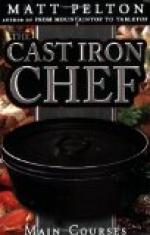“Cogan saw the Panamanian army at dress parade one day—after the Revolution that was. About two hundred darkies, mostly boys of thirteen or fourteen, barefooted with high-water pants on. Cogan’s notion of it was that a dozen good huskies with baseball bats could’ve landed on their peninsula any fine, sunny afternoon and in ten minutes rushed the whole Panamanian army into the Pacific Ocean—that is, if our warships would let them. If we’d only let the Colombians alone they’d soon’ve wound up the Revolution—so Cogan thought, and told Martin so. ’But I s’pose they’ve had hundreds of revolutions in South America?’ he says to Martin.
“‘Hundreds,’ says Martin, and blows more smoke toward the sky. Out in front of the saloon they were sitting, both of ’em balancing between the sidewalk and the wall on the hind legs of their chairs.
“‘Anybody ever killed?’
“’Oh, not more than maybe a few hundred to a time—sometimes a few thousand—’
“‘Hundreds? Thousands?’ says Cogan. ’We hadn’t any more than three hundred killed—that is, killed fighting—in the whole Santiago campaign.’ Cogan had been there.
“‘And you have written a library of books about it,’ says Martin. ’But of course when a few hundred are killed down this way—’tis a great joke. And those little black and tan lads of thirteen or fourteen having to go off shouldering a rifle and kill or get killed—they’re jokes, too. But if a grown man up in your country does it—the band plays when he goes and comes, and he makes speeches about it at banquets—and sometimes he will draw a pension for the next sixty years after it—’ says Martin and said it in his easy way, as if he didn’t care much about it one way or the other; and maybe he didn’t.
“Cogan didn’t find much doing on the streets of Colon after the Revolution was over, so he got in the way of dropping into a place just around the corner from Martin’s, a joint where they sold you drinks to tables in the front room and ran faro layouts in two rooms in back—one for whites and one for blacks.
“Cogan drifted in there with a man who looked like the pictures of grand dukes he’d seen—tall, fine broad shoulders, and dressed in white ducks, and wore a long, well-trimmed dark beard, and swung a gold-headed cane, and had a big ring on one finger. Cogan heard him on the wharf that day—he talked pretty good English—helping out a Chinese merchant who was kicking about the freight charges on some cases he wanted to ship across the peninsula. The American gang running the railroad down there used to charge what they pleased in those days, and Cogan had a sympathy for anybody that bucked them—he’d had to pay eight dollars gold for a run to Panama and back himself—and he and the grand duke got chummy and looked the town over together; but not much to look at, and this evening they drifted into this place—the Russian taking a high-ball and Cogan another ginger ale—to have an excuse to hang around and see what was doing.




